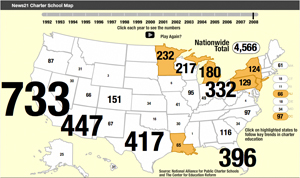Rebuilding Communities From the School Up, cont’d
Kai Carter | Jul 27, 2009 | Comments 1
Redefining Community
The distance between students and schools has also detached families from their neighborhoods. Previously, residents say, parents could depend on neighbors to pick up their children once the school day was done. Now families must work to form new bonds and support networks in more fractured school communities. This all becomes more complicated if siblings attend different schools, something that happens more and more since New Orleans’ charters do not always give lottery enrollment preference to siblings or to kids who live within walking distances.
Still, some parents, like Traemel Day, feel empowered by the opportunity to send their children to different schools based on their individual personalities and needs. Day has an 8-year-old son at Samuel J. Green Charter School and a 5-year-old son and 11-year-old daughter at Andrew H. Wilson Charter School. She can describe a night when she raced back and forth to attend Science Night at one and Parent Night at the other. When asked about these logistical challenges, Day said she feels that the academic rigor and the “extras” that charters offer make it all worthwhile. “It’s worth it, if that’s what’s needed to grasp your child’s attention,” she explains.
In Day’s view, the charter schools’ curriculum and student performance is an improvement over pre-Katrina public school days. Wilson was labeled by the state as “academically unacceptable” when it was a public school; less than 20 percent of its students scored at grade level. After its first year as a charter, 50 percent were achieving in math and reading on grade level, and after two years, that number rose to 72 percent. But comparing pre- and post-Katrina scores may be misleading because the current Wilson student body is completely new.
Connie Yeaton, chair of Wilson’s School Board, credits much of the school’s success to the extra effort it has put in building community through parent liaisons, partnerships with local organizations, and holiday celebrations. They also meet families’ needs with extended school days, social services, dental exams, haircuts and even Christmas gifts.
“The children are the victims and if we don’t help them, we know their parents can’t at this point,” Yeaton said. “They’re trying to struggle to get back into a house.” She and other charter advocates claim that charter schools’ flexibility allows them to serve their populations in ways that traditional New Orleans public schools could not.
Connie Yeaton at Andrew H. Wilson Charter School
Room for Debate
Yeaton believes the charter school movement is “the salvation of the New Orleans public school system.” Others, like Karran Harper Royal, member of the Gentilly Civic Improvement Association’s education committee, are less enthusiastic. This August, the association will open the doors of the brand new Greater Gentilly Area High School. The neighborhood that surrounds this new school was once home to four public schools–all abandoned after Katrina flooded them with 10 feet of water. Royal is feeling incredible pressure to charter the new school, but is resistant to buy into a system that still has many flaws.
One inequity, she believes, is that charter schools are allowed to accept or reject children as they choose–an option not available to traditional public schools. Wilson, for example, reserves the right to turn families away if they refuse to accept the school’s mental and health services. With schools free to abandon so-called “difficult” students, and parents free to pull out of situations they deem unsatisfactory, Harper Royal says there is little incentive for the two parties to stick it out and improve when the going gets rough.
Charter enthusiasts counter that quality control is more rigorous in charter schools. Charters must perform or be shut down, says Elizabeth Garrett of the Louisiana Charter School Association. Only one charter school has encountered this fate, but with many schools struggling to fill seats, more are expected to falter. Harper Royal is concerned about the students of these soon-to-be forsaken schools. She worries about the social and psychological consequences of bouncing children from school to school, ripping them from one community after another. “People who are advocates for chartering and are going with this ‘business’ model don’t understand that we are dealing with real human lives here,” she argues.
Karran Harper Royal at Greater Gentilly Area High construction site
Ramsey Green, an interim deputy superintendent in the Recovery School District — the state-run district for academically-failing schools — recognizes that the current “open-choice” system may not be the most sustainable way to provide education, especially since transportation costs are so high. Yet, the district continues to build charter and non-charter open-enrollment schools. Green explains, “Our goal is to build enough schools where these transportation costs go down because kids have an excellent school within a half a mile of where they live.”
Filed Under: New Orleans in Depth
About the Author: Carter is a master in public policy candidate at the Harvard Kennedy School of Government where she also is a senior editor for the Harvard Journal of African American Public Policy. She is specifically interested in how policy impacts minority and underserved populations. Originally from Los Angeles, Carter graduated from Brown University with a bachelor’s in international relations. In 2007, she secured a Rotary Ambassadorial Scholarship for studies at the University of the South Pacific and interned at the United Nations Development Program in Fiji. After, Carter worked at the Woodrow Wilson International Center for Scholars in Washington.














That is really insightful. It gave me some ideas and I’ll be writing them on my blog eventually. I’m bookmarking your blog and I’ll be back again. Thank you again!